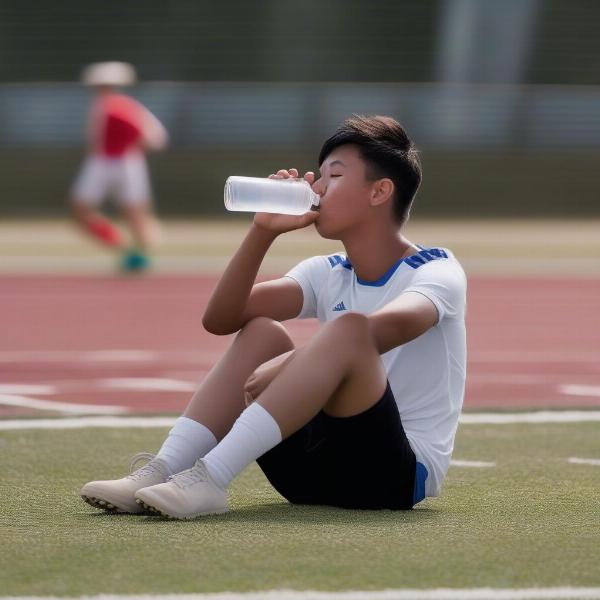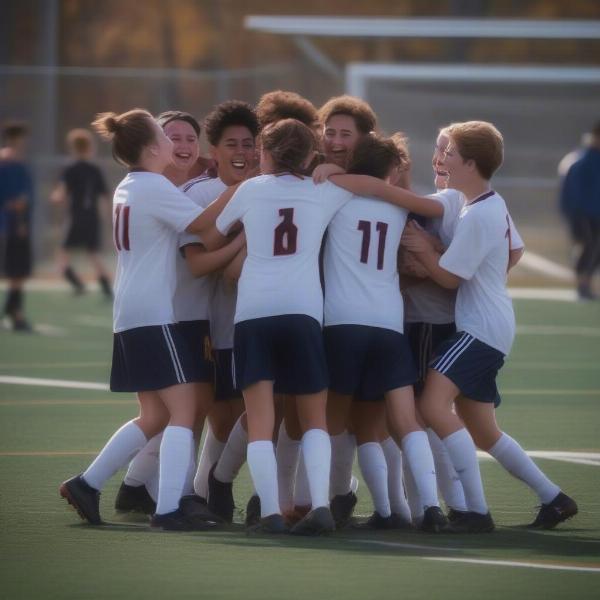JV soccer games, a crucial stepping stone for aspiring athletes, typically run shorter than varsity matches. Understanding the duration of these games is essential for players, coaches, and families alike.
The Typical Length of a JV Soccer Game
Most JV soccer games are comprised of two 40-minute halves, totaling 80 minutes of play. A 10-minute halftime break usually separates the halves, allowing players to rest and strategize. This shorter game length compared to varsity games helps younger players develop their skills and stamina without overexertion. However, this standard duration can vary depending on a few factors.
Factors Influencing JV Soccer Game Length
While the 80-minute timeframe is common, several factors can influence the actual length of a JV soccer game. These include league rules, tournament regulations, and even weather conditions.
League and Tournament Rules
Different leagues and tournaments may have specific rules regarding game duration. Some leagues might opt for shorter halves, especially for younger age groups. Similarly, tournament play often features shorter games to accommodate a larger number of teams and matches within a limited timeframe. Always check the specific rules for the relevant league or tournament.
Overtime
In some cases, overtime periods might be added if the game ends in a tie. Overtime rules vary, but they generally involve two shorter periods of extra time, often 5-10 minutes each. If the tie persists after overtime, the game might be decided by penalty kicks.
Weather Delays
Inclement weather can also affect the length of a JV soccer game. Lightning or heavy rain can cause delays or even postponements, impacting the overall timeframe. These delays are prioritized for player safety and are at the discretion of the game officials.
Preparing for a JV Soccer Game
Knowing the expected game length allows players and coaches to prepare effectively. Proper warm-up, hydration, and pacing are essential for optimal performance throughout the game.
Warm-up Routines
A thorough warm-up routine is crucial to prepare the body for the physical demands of the game. This typically involves dynamic stretching, light jogging, and passing drills to loosen muscles and enhance coordination.
Hydration and Nutrition
Staying hydrated is vital for performance and endurance. Players should drink plenty of water before, during, and after the game. Proper nutrition also plays a role, with light snacks or meals providing sustained energy.
 JV Soccer Player Taking a Hydration Break
JV Soccer Player Taking a Hydration Break
Pacing Strategies
Understanding the game’s length allows players to manage their energy effectively. Pacing oneself, especially in the first half, can help prevent fatigue and ensure peak performance in the later stages of the game.
Benefits of Shorter JV Soccer Games
The shorter game format offers several benefits for developing players. It allows for more focused skill development, reduces the risk of overuse injuries, and maintains engagement throughout the match.
Skill Development
The shorter game duration allows coaches to focus on specific skills and tactics without overwhelming younger players. This concentrated approach can lead to faster skill acquisition and improved game understanding.
Injury Prevention
Shorter games reduce the physical strain on developing bodies, minimizing the risk of overuse injuries. This is especially important for younger athletes who are still growing and developing their physical strength.
Maintaining Engagement
The shorter timeframe helps maintain player engagement and focus. This focused attention can lead to improved learning and a more enjoyable playing experience.
 JV Soccer Team Celebrating a Victory
JV Soccer Team Celebrating a Victory
FAQ: Common Questions About JV Soccer Game Length
Here are some frequently asked questions about the length of JV soccer games:
- Are JV soccer games always 80 minutes long? No, the length can vary based on league rules, tournament regulations, and weather delays.
- How long is halftime in a JV soccer game? Halftime typically lasts 10 minutes.
- Is overtime common in JV soccer games? Overtime rules vary depending on the league or tournament, but it’s not uncommon.
- How long are overtime periods in JV soccer? Overtime periods are usually 5-10 minutes each.
- What happens if the game is still tied after overtime? The game is typically decided by penalty kicks.
- How do weather delays affect game length? Weather delays can shorten the game or even lead to postponement.
- Why are JV soccer games shorter than varsity games? Shorter games are designed to accommodate the developing physical abilities and skill levels of younger players.
Key Takeaways on JV Soccer Game Length
Understanding how long JV soccer games are is important for all involved. While the standard is 80 minutes with two 40-minute halves, variations exist depending on specific rules and circumstances. Remember to check the relevant league or tournament guidelines for the most accurate information. By being prepared and informed, players, coaches, and families can maximize the benefits of this crucial stage in a young athlete’s soccer journey. Share this article with anyone who might find it helpful and ensure everyone is on the same page regarding JV soccer game durations!

